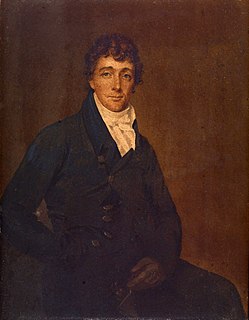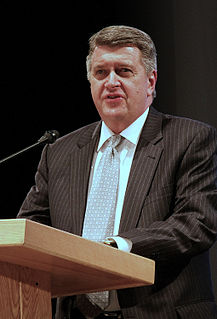A Quote by Thomas Aquinas
Sacred Scripture, since it has no science above itself, can dispute with one who denies its principles only if the opponent admits some at least of the truths obtained through divine revelation; thus we can argue with heretics from texts in Holy Writ, and against those who deny one article of faith we can argue from another. If our opponent believes nothing of divine revelation, there is no longer any means of proving the articles of faith by reasoning, but only of answering his objections - if he has any - against faith.
Quote Topics
Above
Against
Another
Answering
Any
Argue
Article
Articles
Believes
Deny
Dispute
Divine
Divine Revelation
Faith
His
Holy
Itself
Least
Longer
Means
Nothing
Objections
Obtained
Only
Opponent
Our
Principles
Proving
Reasoning
Revelation
Sacred
Sacred Scripture
Science
Scripture
Since
Some
Texts
Those
Through
Thus
Truths
Writ
Related Quotes
...[sacred] doctrine is especially based upon arguments from authority, inasmuch as its principles are obtained by revelation: thus we ought to believe on the authority of those to whom the revelation has been made. Nor does this take away from the dignity of this doctrine, for although the argument from authority based on human reason is the weakest, yet the argument from authority based on divine revelation is the strongest.
I speak "with absolute certainty" only so far as my own personal belief is concerned. Those who have not the same warrant for their belief as I have, would be very credulous and foolish to accept it on blind faith. Nor does the writer believe any more than her correspondent and his friends in any "authority" let alone "divine revelation"!
There are hard texts in each tradition which we must confront and ask ourselves, 'Can we reinterpret those texts to allow us to live peaceably, and respectfully, with people of other faiths?' That is a job only Jews can do for Judaism, only Christians can do for Christianity, and only Muslims can do for Islam. But sometimes the sight of someone in one faith wrestling with that faith can empower you to wrestle with another faith.
I believe not only that religious faith will be victorious, but that it is vital to humankind that it shall be. We may differ in form and particulars in our religious faith. Those are matters that are sacred to each of our inner sanctuaries. It is our privilege to decline to argue them. Their real demonstration is the lives that we live.
The truth is that my work - I was going to say my mission - is to shatter the faith of men here, there, and everywhere, faith in affirmation, faith in negation, and faith in abstention in faith, and this for the sake of faith in faith itself; it is to war against all those who submit, whether it be to Catholicism, or to rationalism, or to agnosticism; it is to make all men live the life of inquietude and passionate desire.
It is not his business to argue men into faith, for that cannot be done; but it is his business to demonstrate the intellectual adequacy of the biblical faith and the comparative inadequacy of its rivals, and to show the invalidity of the criticisms that are brought against it. This he seeks to do, not from any motive of intellectual self-justification, but for the glory of God and His gospel.
Any man who stands for progress has to criticize, disbelieve and challenge every item of the old faith. Item by item he has to reason out every nook and corner of the prevailing faith. If after considerable reasoning one is led to believe in any theory or philosophy, his faith is welcomed. His reasoning can be mistaken, wrong, misled and sometimes fallacious. But he is liable to correction because reason is the guiding star of his life. But mere faith and blind faith is dangerous: it dulls the brain, and makes a man reactionary.
If you do not assume the law of non-contradiction, you have nothing to argue about. If you do not assume the principles of sound reason, you have nothing to argue with. If you do not assume libertarian free will, you have no one to argue against. If you do not assume morality to be an objective commodity, you have no reason to argue in the first place.





































